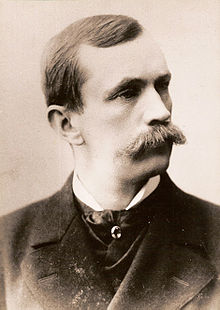- Ola Hansson
-
Ola Hansson (November 12, 1860, Hönsinge, Sweden – September 26, 1925, Büyükdere, Turkey) was a Swedish poet, prose writer, and critic.
Contents
Biography
Hansson published his first works, Dikter ("Poems") in 1884 and Notturno in 1885. In those he expressed a celebration of the natural beauty and folk culture of his native province Skåne, southern Sweden. The raffined poetry did not fit the Swedish realism of the 1880s-90s and gained little attention. Hansson followed up with the decadent Sensitiva Amorosa (1887), a collection of morbid, erotic sketches that shocked the Sweden of his day. The reaction from the public was harsh, and Hansson left his country for Germany in 1889. He would then continue to live abroad for the remainder of his life, in countries such as Switzerland and Turkey (where he also died).
Ideas and works
In the period following the notorious Sensitiva Amorosa (1887) he proclaimed himself an adherent of Nietzschean ideas, a view he made public with the cycle of poems Ung Ofegs visor (1892). Here he voiced his contempt of the general crowd and belief in the Übermensch. Hansson, together with Georg Brandes was instrumental in calling attention to Nietzsche's works in Germany, and he also helped publicize Strindberg's work in German magazines at a point when the latter was not appreciated in Sweden. The two men rapidly became enemies, though, after Strindberg moved to Berlin in 1892.
While in Germany, he wrote and published works in German, Danish and Norwegian, for example Fatalistische geschichten (German, 1890) which was published the same year in Danish as Skæbnenoveller. Other German language works during this period included Im Huldrebann (1895), Meervögel (1895), Der Weg zum Leben (1896; also in Swedish, Vägen till lifvet, 1896), and Der Schutzengel (1896).
Later in the 1890s he came to loathe Germany, and furthermore grew a hatred of people into fanatical proportions, manifesting itself in anti-semitism among other things. For a short period he expressed an adherence of Catholicism. These peculiarities further alienated him from contemporary Sweden. He did however gain some recognition in Germany thanks to his German wife Laura (1854–1928; pseudonym Laura Marholm), who spread Hansson's works to a larger audience.
Legacy
A productive writer, his writings are uneven. However, he is considered today a pioneer within modern Swedish poetry, who reshaped nature poetry; he has sometimes been called the only one among late-19th century Swedish poets who really absorbed the influence of French Symbolism and "fin-de-siècle" moods. In 1906 Vilhelm Ekelund, a major poet of the next generation, published a paeanic poem hailing him as the like of Pindar, the bard of his province and a poetic forerunner. Ekelund, like Hansson, was a native of the rural southern province of Scania and felt in opposition to the literary fashions of Stockholm; he felt these had rejected Hansson and driven him into exile. From this point on, Ola Hansson began to be reappraised, and in his final years an (unsatisfying) edition of his collected works began to appear in Sweden (greeted by the author's angry pointing out of its shortcomings in newspaper articles dispatched from his exile). He has remained, in particular, an invoked hero of Scanian writers.
In 1913 he was awarded the first scholarship in memory of Gustaf Fröding, elected by Swedish university students.
References
- Merriam-Webster's Encyclopedia of Literature, p. 513
- Tigerstedt, E.N. Svensk litteraturhistoria (Solna, 1971)
- Österling, Anders, Ola Hansson; Minnesteckning (Svenska Akademins Minnesteckningar, Stockholm, 1966)
- Widell, Arne, Ola Hansson i Tyskland (Uppsala, 1979)
Categories:- Swedish-language writers
- 1860 births
- 1925 deaths
Wikimedia Foundation. 2010.

